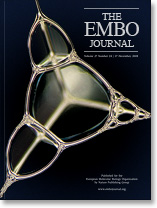 Last week, we reported on an investigation at Glasgow’s Beatson Institute for Cancer Research into the circumstances of a retraction in Cell. That retraction wasn’t signed by the paper’s first author, Lynne Marshall, who had since moved on to another institution. (We have yet to hear back from Marshall about why she didn’t sign.)
Last week, we reported on an investigation at Glasgow’s Beatson Institute for Cancer Research into the circumstances of a retraction in Cell. That retraction wasn’t signed by the paper’s first author, Lynne Marshall, who had since moved on to another institution. (We have yet to hear back from Marshall about why she didn’t sign.)
As a commenter on that post pointed out, Marshall was the first author on an EMBO Journal paper that cited the now-retracted Cell paper several times. So we wanted to find out if there were any questions about the EMBO Journal paper, “Nutrient/TOR-dependent regulation of RNA polymerase III controls tissue and organismal growth in Drosophila,” published in February of this year. Savraj Grewal, Marshall’s PI at the University of Calgary until her postdoc ended earlier this summer, tells Retraction Watch: Continue reading Senior author “fully confident” in paper that cites retracted Cell study and shares first author
 Diederik Stapel’s CV continues to crumble, with five more retractions for the disgraced Dutch social scientist who admitted to fabricating data in his studies.
Diederik Stapel’s CV continues to crumble, with five more retractions for the disgraced Dutch social scientist who admitted to fabricating data in his studies.






